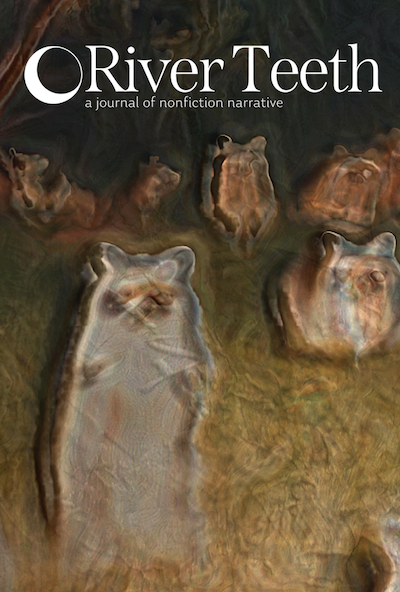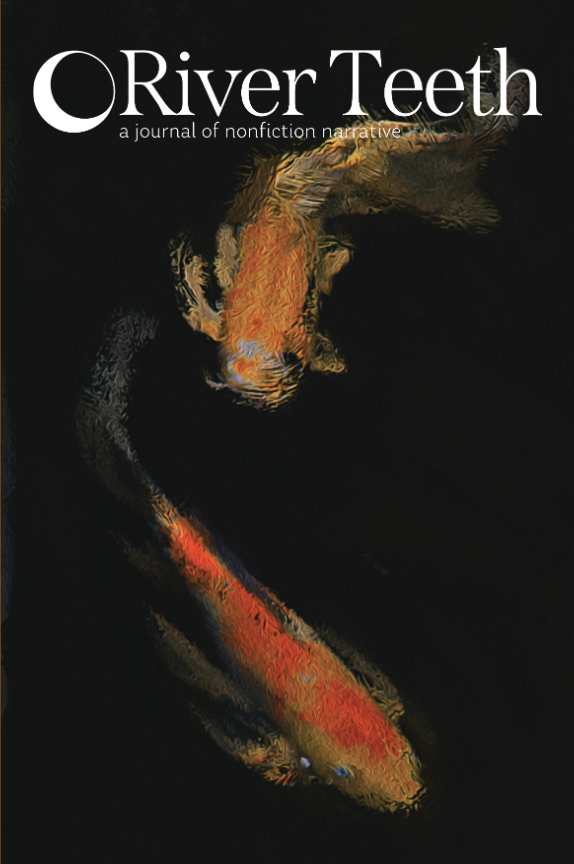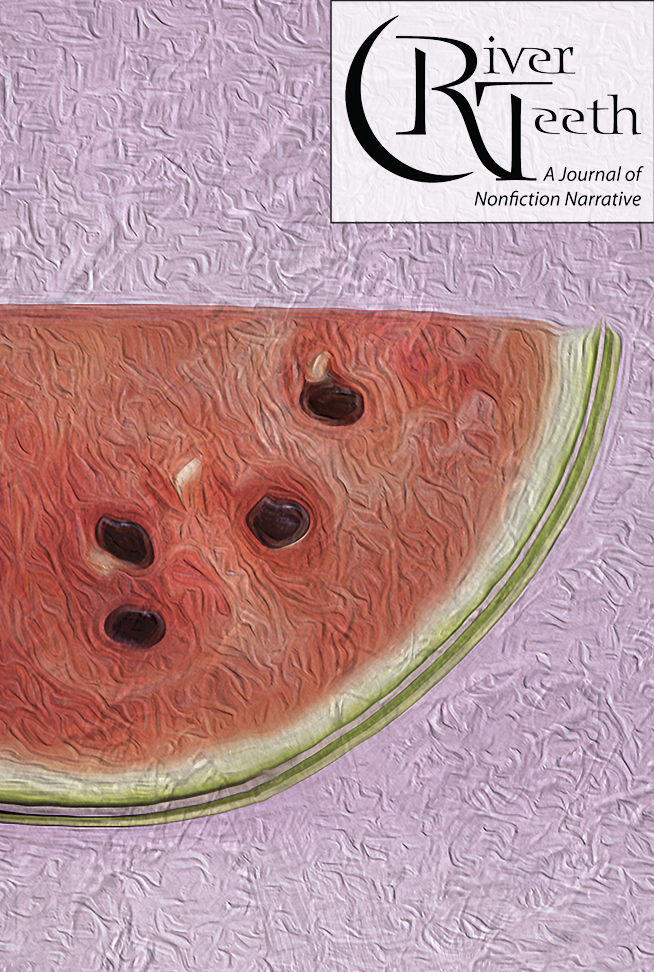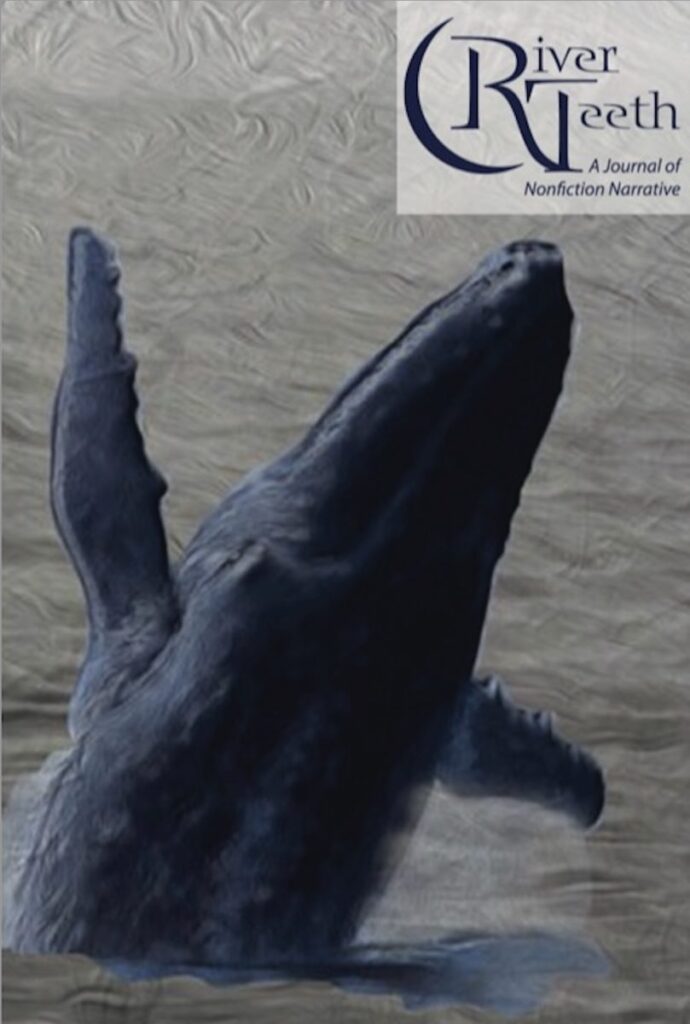By Dan Lehman
It’s been a busy season here at River Teeth, what with selecting Rosemary McGuire’s Out West: A Season on Water as the new River Teeth Literary Nonfiction Prize winner from among nearly two hundred book-length entries. Th en, too, we have just put our seventeenth year of the journal to bed with the final selections to issue 17.2. Each year, we receive some 2,500 submissions to the journal and another two hundred or so full-length book submissions.
We often are asked how we manage to choose from so many submissions from so many fine writers. In an effort to answer that question both for ourselves and our readers, the two founding editors of River Teeth chewed over the topic in a dialogue presented here in slightly edited form:
Dan Lehman: I would say that the first thing we look for is something urgent. We aren’t interested in publishing an also-ran piece by a good writer. We want to publish something that a writer was born to write. We want something that is the most important thing he or she has ever written; we want to prize the fact that they’ve trusted this thing to us. Even if that’s not strictly the case, it has to read with that sort of urgency.
Joe Mackall: Beautiful language isn’t enough, though it certainly helps. And it’s nice if the material is fresh, something that we maybe haven’t heard before. But that’s not definitive either. Something about the writing has to be vertical, has to feel like something has been ripped open viscerally. And I’m not really talking about subject matter. It doesn’t have to be traumatic; it can be quiet and beautiful. But it has to mean something important, and the writer has to communicate that to us.
Lehman: I think we read a lot of manuscripts in which the things that happen clearly mean a lot to the writer, but maybe the writer hasn’t quite yet found a way to make it mean a lot to the reader. The writer often needs to go deeper and to make the work more compelling. But aren’t we throwing around a lot of adjectives? Bottom line: What do we really mean when we say the manuscript must be urgent?
Mackall: It starts, for sure, with giving a moment or a passage a purpose beyond itself. And it does mean searching for the perfect word, the perfect sentence, and the perfect scene to convey that purpose. Something has to reach out beyond.
Lehman: We’re getting closer to the nugget here, but I get the sense we are still talking sort of generally.
Mackall: When that happens, you have to use an example. Take the essay “Colander,” by Lee Martin, which opens his Such a Life. We didn’t publish this particular essay or the book it appears in, but you know we would have done anything to get it. Now that’s the way to open a book. His opening would have made our journal or our book contest cut, for sure.
Lehman: OK, why?
Mackall: OK, so he’s a little boy and he answers a phone call for his grandmother, and he hears his Aunt Anna say: “Lee, tell Grandma to bring her calendar.” And the writer here fi nds a way to take that innocuous moment, something that could happen any day, and to bring it to us with a precision that captures true emotion, that is not sentimental. It turns out that it was his mother on the phone and that she had asked Lee for a colander, not a calendar, and that he had not recognized his own mother’s voice. It’s a moment where Lee’s own family history breaks into the text. So he can imbue that moment with forty years of life experience. It’s what makes it pulsate with meaning.
Lehman: Yes. And later in the essay, the adult narrator who was once the boy confesses: “Sitting here now, I try to recall my mother’s voice, and I can almost manage it, but not quite. You’d think we’d remember forever the way our parents spoke, but it’s not really the truth, is it? Their voices, once they’re dead, become a stir of air, a tingle on the skin, a thrumming in our chests, a murmur heard, fuzzy with static, on a phone line—you know the sort I mean . . .” And there’s the thing.
Mackall: Exactly. And then the essay ends this way: “As the years go on, she’ll take great joy in telling the story of the day I thought she said calendar, but that day in our farmhouse, even though she’s laughing because I confused her voice for my aunt’s, the laughter finally fades away, and, when it does, I feel peculiar. It’s something about the way my mother looks at me, disappointed, and I don’t know what to call this thing I feel, so I seal it up inside me, where it waits to be turned and strained, this shame, this longing. ‘Didn’t you know?’ she says, just a hint of hurt in her eyes. I wish I could tell her now, yes, I knew. I always knew. ‘Mercy,’ she says. ‘Didn’t you know it was me?’”
Lehman: So the underlying idea is that the kind of writing we are after will make us see something about the world in a fresh way or remind us of something important that has an arguably public dimension, even though the content itself, as in the example you just used, may be very personal and private.
Mackall: Right. Maybe another way to explain our process would be to talk a little about what sinks a piece of writing for us. You know we are rooting for every manuscript we pick up because you never know which one will make worthwhile all the reading over all the years. The absolutely perfect book or essay might be the very next one on the pile and you have to be ready for it and open to it.
Lehman: But can we help people understand how we know if it’s not that perfect manuscript?
Mackall: If you are going to write a memoir, or really any nonfiction book that matters, you’ve got to be willing to let the truth ride on its power all the way to the end. What sinks a piece for me is when you can detect that the writer is afraid to let the reader see the truly dark matter—or at least the truly important stuff. You’d be surprised how many writers flinch at exactly that point. A writer can sometimes give with one hand and take away with the other.
Lehman: And so it’s probably a good idea not to flinch—and to get something of the real stakes into the first thirty pages. Still, every bit of that heavy stuff has to be relevant to the effect. We don’t just want to be shocked; we want to be moved.
Mackall: That happens in some union of content and craft. There is a difference between experience and meaning-making. If we are reading along and this happens and this happens, and we still don’t know why it is important, then we know the writer might not be up to it. As our great, dear friend Judith Kitchen said, and I’m paraphrasing, “Nonfiction writers don’t make up, we make of.” So just writing about something that has happened to you is never enough. It’s what the writer does with her own experience, what she makes of it that counts.
Lehman: Maybe the way to say it is that it’s the writer’s business to help to create a reader who can read her work at its best and deepest level. And the first thirty pages or so in a book manuscript, or the first page or two in an essay, is often where that perfect reader is created—or not at all. All sorts of negotiations are happening here: Is this a voice that can last for me over the course of the piece? How is scene conveyed? How does language work at the sentence level, paragraph level? Tense? Diction? What can I expect from its style? Its structure? Is it going to get somewhere for me? Somewhere surprising that was yet there all along?
Mackall: You know we are pulling for every piece from page one for as long as we can. The moment I don’t feel that way I want you to shoot me. Nothing makes me madder than someone who hates reading other people’s work and then gets all cynical and put upon because they have to read it. So if you want to tell people what gets a manuscript a second reading, it is this: The second reads are the ones that never let us off the hook all the way to the end.
Lehman: And the ones we published are ones where we called each other in the middle of the night and said we had to have this one—that we would die if we saw someone else get it and knew that we could have had it.
Mackall: Right. That’s the feeling we are always seeking—whether it’s a 250-page manuscript for the book prize, or a long piece or regular-length essay for the journal, or even a sketch of one or two pages. It’s gotta be there. That’s what makes it work.
Lehman: We never really called each other in the middle of the night, did we?
Mackall: Yeah, but you know we wanted to. And that’s the thing that gets the piece all the way to the finish line.
– D.W.L.
Read Contributors’ Notes for Issue 17.2 >












